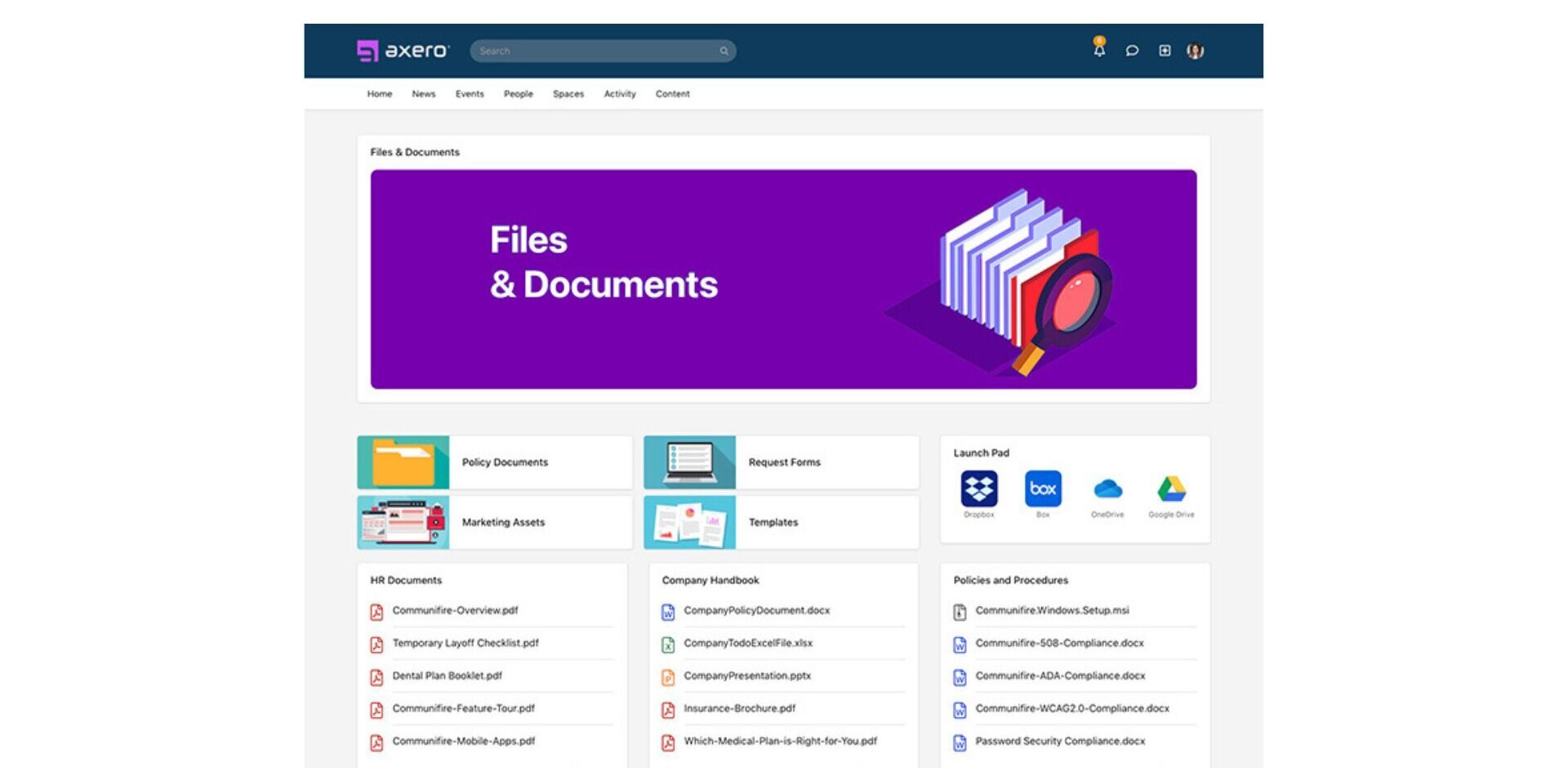
While the quote above may hold true for life’s deepest questions, it’s not particularly helpful when running a business. Beyond desks and computers, and perhaps inventory, a business’s value is the collective sum of the knowledge held by the people who work there.
In every organization, regardless of the size, information is created, captured, shared, and modified. Eventually this information becomes a commodity. Acquiring this information represents a material gain. Information becomes intellectual capital. And that capital can only reach its full potential when it’s made available for the next task, process, project, or product you are are working on.
This, is what we call knowledge management. And the best way to manage this trove of information is by using a knowledge management system (or also commonly referred to as knowledge management software) to centralize and distribute information. When teams have easy access to the information they need, whether it’s employee training videos, spreadsheets, policies, really anything pertinent to their job, you’re able to boost productivity and prompt a more collaborative culture.
But as you know, no business operates the same. And even within one business, no department operates the same, either. Different teams need different things, like technology, information, and resources, to be successful at their roles within the organization.
That’s why in this blog post, we’re not only going to take a deeper look into what knowledge management is and how knowledge management systems work, but we’ll also explore different examples of companies using knowledge management systems in their own unique use cases.
With that said, let’s jump to it!
What is knowledge management?

We took a philosophical approach in the intro, but to cut to the chase, knowledge management is a set of processes that govern the creation, distribution, and utilization of an organization’s collective knowledge. Think of it as a digital library or a community hub where everyone can find what they need without the chaos. In the face of communication and data overload, knowledge management helps make smarter and more informed decisions, builds your business, and cultivates a strong company culture.
You know that whole “tree falling in the forest” question? Whether or not it fell is irrelevant because nobody knows the answer. Knowledge is not valuable in and of itself and it does not exist in a void. Information becomes valuable when it is communicated — and yet, research shows that communication remains a major challenge for a majority of organizations. According to a study by SIS International Research, 70% of small to mid-size businesses cite ineffective communication as their primary problem. A business with 100 employees spends an average downtime of 17 hours per week clarifying communication. This translates to an approximate cost of $530,000 a year. In another study, Fierce, Inc. found that 86% of employees and executives cite lack of collaboration or ineffective communication for workplace failures. Businesses lose tens of billions of dollars a year by failing to share knowledge.
What can we do about this? The short answer is to implement effective knowledge management strategies or processes that connect your employees to the information they need. In most, if not all cases, this entails utilizing knowledge management tools to be the connector and storer of your organizational knowledge.
What are knowledge management systems?

Knowledge management systems (also called KMS), are platforms that store and share knowledge and content to teams and departments. You’re able to organize information in a way that fits into how your business operates, which makes knowledge sharing easy and breaks down silos across a company.
One point to note is that there are different kinds of tools and out there. A knowledge management system can be a standalone software based on a specific function, like document management, employee onboarding, or cases and tickets. Some may bundle a couple functions together. Or in some cases, you may be using a software like an intranet that is designed for numerous workplace needs, like internal communication, knowledge management, and collaboration.
To figure out what you need, the first thing to consider is your current knowledge management process, or how knowledge flows through your organization. No matter the size or sector, knowledge moves through existing paths. These paths must be traced in order to identify information source points, critical functions that lead to knowledge creation, and risky bottlenecks that impede the information flow to the point of use. You need to create a map, or delegate a knowledge manager to create one. This provides a blueprint from which to make changes and improvements.
For example, if a goldmine of information is held in a wiki that no one visits, it’s probably time to explore ways to make it more accessible. Maybe that information is relocated someplace else. Maybe the wiki is not advertised prominently enough. Maybe the login process is laborious and a more streamlined access point is needed. Whatever the case, an effective knowledge management strategy starts with an accurate and nuanced understanding of the way information of various types is communicated throughout your business. By tapping into these pathways of social interaction, an enterprise can focus on creating, storing, updating, and distributing knowledge or intellectual capital, not only at work, but also in the marketplace.
Key knowledge management system features
There’s a lot you can do with a knowledge management system. Maybe you want to make information sharing easier between team members, or maybe you have a lot of valuable assets, but no one knows where to find it. Knowledge management tools offer different ways to organize, distribute, and streamline different kinds of information to different groups of people. And when you put it all together in a centralized platform, you get a knowledge management system. Here’s some of the tools out there.
1. Knowledge Bases: The go-to resource
Imagine having a comprehensive library of FAQs, how-to guides, and troubleshooting tips at your fingertips. That’s what a knowledge base offers. It’s a centralized repository where employees can access valuable information without having to hunt down other employees or dig through emails. For example, if your team is using a new software tool, a knowledge base can provide step-by-step instructions, best practices and even how to videos, so your entire team has instant answers and can be more self sufficient in their day-to-day.
2. AI: The ultimate knowledge manager

AI offers a lot of possibilities for how companies implement knowledge management initiatives in their workplaces. Between content editors to interactive chatbots, like Axero Copilot, AI accelerates the time it takes to find, share, and create information that employees need. For a chatbot like Axero Copilot, employees can ask the bot any question and not only get instant answers but also links to relevant content, excerpts, recommended reading, and most importantly, the right information without taking time away from other team members.
3. Onboarding Spaces: Set new hires up for success

Onboarding can often feel overwhelming for new hires, but a well-designed onboarding space in your knowledge management system can change that. This feature allows you to create a tailored experience for newcomers, with resources like company culture videos, training materials, and introductions to team members. It’s like a virtual welcome mat that helps new employees hit the ground running and feel connected from day one.
4. Document Management: Keep valuable knowledge organized

Gone are the days of cluttered folders and lost documents. A solid document management feature in your knowledge management system helps you store, categorize, and retrieve documents easily. You can tag files, set permissions, and even track versions, ensuring that everyone is working with the most up-to-date information. For example, let’s say your marketing team is collaborating on a campaign—everyone can access the latest branding guidelines without sifting through outdated files.
5. Collaboration Tools: Teamwork made easy
Communication is key in any workplace, and knowledge management systems often comes with collaboration tools that make it simple to share ideas and feedback. Think of features like discussion boards, project management tools, and shared calendars. They can even be crowdstorming forums for customers share feedback. These tools promotes collaboration by encouraging teamwork and transparency, making it easier to keep everyone in the loop. Whether you’re brainstorming a new project or checking in on deadlines, these features streamline the entire process.
6. Search Functionality: Find it fast
Let’s be honest, even the best systems can be overwhelming if you can’t find what you need. That’s where powerful search functionality comes in. A knowledge management system should allow users to search by keywords, tags, or categories, making it easy to locate specific information quickly. No more wasting time scrolling through endless lists—just type what you need and go!
Knowledge management use cases

No business or organization is the same, and so the way knowledge management looks in every workplace will vary. Even two separate organizations operating under the same domain may need separate knowledge management systems. Why? Because each entity operates with a distinct set of environmental factors that lead to unique information sources and modes of capturing that information, as well as varying preferences in methods of distributing it. Inspired by some of our customers, here’s some examples of different workplaces leveraging knowledge management systems.
1. Remote and frontline workers
Here’s a prime example of how a robust knowledge management system can change the game. Let’s say you’re a food company with sales representatives who are constantly on the road selling products and servicing regional stores. With so many frontline workers out of the office and on-the-go, the ability to communicate constantly and seamlessly becomes essential. A knowledge management system can give your reps immediate access to critical information from the field, whether its marketing materials or an update on an order, and also keep their managers apprised of what’s going on. It’s just as important to ensure managers know what’s going on so they can provide support and drive sales numbers up the chain.
2. Nonprofits and distributed organizations
When it comes to nonprofit organizations, like our customer AiArthritis, it is essential to maintain a sense of community for supporters and staff. In order to thrive, a nonprofit needs an efficient and engaging way to communicate between directors and members, attract new members, activate existing ones, and organize around issues is key. Maybe the organization is working to stimulate conversation around bullying in schools or encouraging its members to write their Congressional Representatives about an environmental bill. Knowledge management systems can provide the tools needed to inspire members to share news and information, self-organize, and collaborate on projects. PS, check out how Axero serves as nonprofit intranet software!
3. Data and content heavy workplaces
Every organization needs some kind of information management. But especially for a business that relies heavily on documents, a knowledge management system is a must. For instance, we have a customer who specializes in personal loans. Just by the nature of the industry, this company deals with a lot of policies, procedures and forms. They also have over a dozen offices across the US where laws are different in each state and are constantly changing. Instead of overloading employees with emails, this company uses a knowledge management system to centralize information about policies and alert teams about updates.
4. Franchises and scattered offices
For a distributed organization, cohesive business communication is imperative for maintaining company culture and driving engagement. It’s also important to make knowledge sharing easy and organic since employees are physically secluded from each other. With a knowledge management system, you can bring the office environment, and all the collaborative benefits that come with it, to your remote employees and dispersed offices. Aside from housing your content and files in an easily accessible place, you can also bring people together with social tools, people directories, and culture hubs.
Explore Axero as your knowledge management system

When it comes to finding a knowledge management system, there’s many routes you can take. If you’re curious about a software that combines numerous workplace needs, such as internal communication, employee experience, and knowledge management, check out our platform, Axero! Axero is an intranet software and our strong suit is in flexibility. So if you relate to any of those use cases above, our platform can be easily tailored to distribute information to whoever needs it. It’s all about providing you with the functionality you need to drive productivity, while giving your end users the experience they need to be more aligned and engaged.
If you want to learn more about how Axero could fit into you workplace, book a call! We’re happy to show you around the platform and answer any questions you may have.













 info@axerosolutions.com
info@axerosolutions.com 1-855-AXERO-55
1-855-AXERO-55


